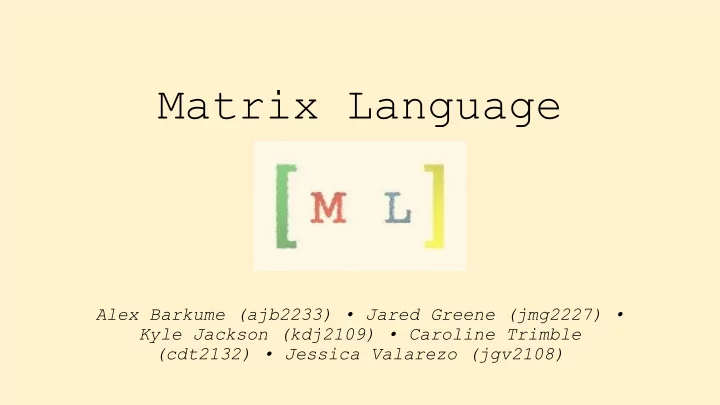

Matrix Language Alex Barkume (ajb2233) • Jared Greene (jmg2227) • Kyle Jackson (kdj2109) • Caroline Trimble (cdt2132) • Jessica Valarezo (jgv2108)
Motivation • Write an imperative language specifically designed for matrix manipulation • Simplicity of treating an image as a large matrix • Matrix datatype for matrix functions and manipulation, as well as image processing • C-like syntax and structure of ML gives users freedom and control • Large standard library provides both image processing and matrix functions
Overview • C-like syntax • Main Datatype: Matrix • Easily import picture (PPM) – automatically becomes matrix declaration • Print functions to output a PPM • Large matrix-oriented standard library • Compiles to the Low Level Virtual Machine (LLVM)
Basics Function Declaration: Primitive Types: void addIntTuples(int[] x, int[] y, int len) Int, Float, Bool, Char { // function } Datatypes: Tuple, Matrix #include <stdlib.mxl>; Declaration/Initialization: m1 = open(“pic.ppm”); //declares and initializes int a; //matrix of pic.ppm a = 3; float[2:2] b; b = [|2.4, 5.3| 8.2, 100.2|]; File Extension: .mxl
Basics (Continued) Operators: Control Flow: if ( x > 0 ) { Standard C arithmetic and print(x) ;} equality operators --> else { primitive types print(y);} [] Tuple access while ( y == false ){ [:] Matrix access prints(“hi”);} @, @@, @@@ Access pointer to for (i=0; i < len ; i = i+1 ){ first element x = tup[i]; print(x); $ Dereference pointer } .+ Increment pointer
(Very) Brief Tutorial main function 1 #include <stdlib.mxl>; 2 int main() { tuple declaration 3 int[3] a; 4 int[3] b; 5 int i; 6 tuple 7 a = [1, 2, 3]; initialization 8 b = [1, 2, 3]; 9 10 addIntTuples(@a, @b, a.length); // Add b to a -> change a pointer 11 function call 12 printIntTuple(@a, a.length); 13 14 return 0; } function arguments return statement
(Very) Brief Tutorial expecting a pointer function name 1 void addIntTuples(int[] x, int[] y, int len) { parameters 2 int i; 3 4 for (i = 0; i < len; i = i + 1) { 5 $x = $x + $y; dereference 6 x = x.+; pointer increment 7 y = y.+; 8 } 9}
Hello, World! 1 int main() { 2 prints("Hello, World!"); 3 4 return 0; 5 }
Generated Code 1 ; ModuleID = 'ML' 2 3 @fmt = private unnamed_addr constant [4 x i8] c"%d\0A\00" 4 @fmt1 = private unnamed_addr constant [4 x i8] c"%f\0A\00" 5 @fmt2 = private unnamed_addr constant [3 x i8] c"%d\00" 6 @fmt3 = private unnamed_addr constant [3 x i8] c"%f\00" 7 @fmt4 = private unnamed_addr constant [4 x i8] c"%c\0A\00" 8 @fmt5 = private unnamed_addr constant [3 x i8] c"%c\00" 9 @.str = private unnamed_addr constant [15 x i8] c"Hello, World!\0A\00" 10 11 declare i32 @printf(i8*, ...) 12 13 define i32 @main() { 14 entry: 15 %printf = call i32 (i8*, ...)* @printf(i8* getelementptr inbounds ([15 x i8] * @.str, i32 0, i32 0)) 16 ret i32 0 17 }
Structure of the Compiler Tokens AST Input semant. codegen. scanner. parser. prep.ml Code ml mll mly ml AST LLVM Source Source without Include/Open LLC Executable
Structure of a Program type program = var_dec list * func_decl list type func_decl = { datatype : datatype; fname : string; formals : var_dec list; locals : var_dec list; body : stmt list; }
Testing • Integration Testing • Automation of Test Suite • called by ./testall.sh • Tests on all types, operators, element access and re-assignment, exceptions • Each function added to stdlib.mxl has a test • As of commit 6cc8fe8, 105 tests total
Demo
Recommend
More recommend